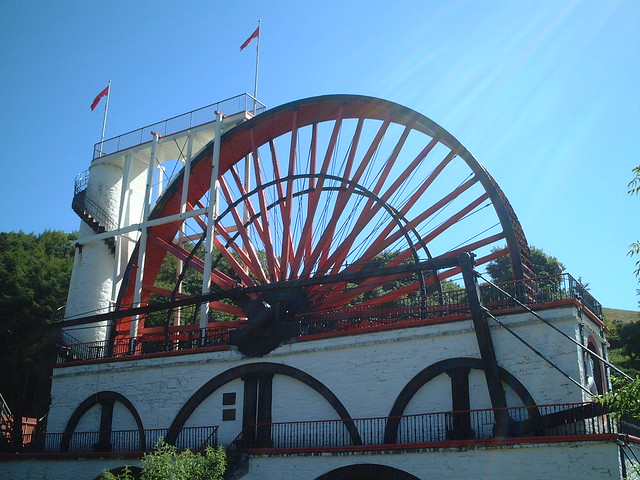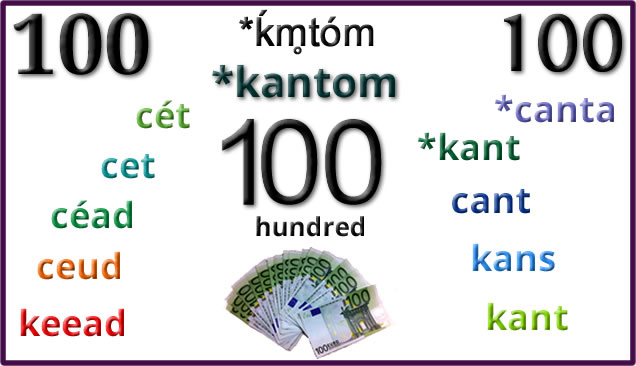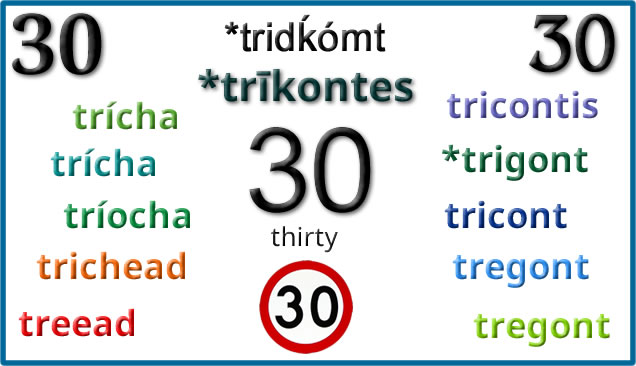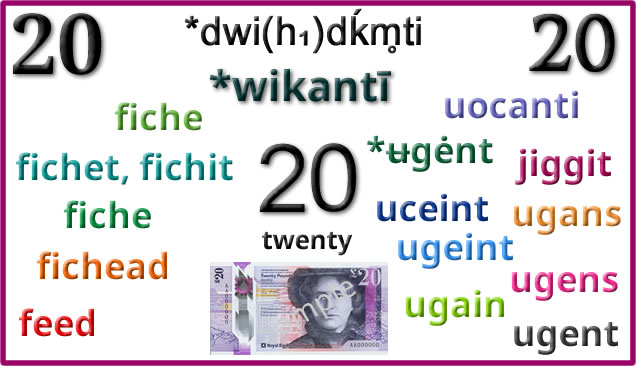Words for fear, dread and related words in Celtic languages.
| Proto-Celtic | *oβnus/*obnu- = fear *exsoβnos = fearless |
|---|---|
| Gaulish | *exsoβnos = fearless |
| Old Irish (Goídelc) | omun [ˈo(ː)ṽun] = fear, dread, afraid airomun = great fear |
| Middle Irish (Gaoidhealg) | ómun, omun, ómain, óman, úama(i)n, úamun = fear, afraid, apprehensive, fearful, terrible omnach = afraid, easily frightened, timid, fearful, fear-inspiring esamain, essamain = fearless, bold, daring |
| Irish (Gaeilge) | uamhan = fear, awe, dread, terror uamhnach = dreadful, terrifying, fearful, timorous uamhnacht = dreadfulness, terror, fearfulness, timorousness uamhnaigh = to frighten, terrify, become afraid, fear, dread |
| Scottish Gaelic (Gàidhlig) | uabhann [uəvən̪ˠ] = dread, terror, horror uabhannach [uəvən̪ˠəx] = terrible, horrible, astounding, shocking |
| Manx (Gaelg) | owan = dread, fright owanagh = fearful, frightening, frightful |
| Proto-Brythonic | *oβn [oβn] = fear *exoβn [ɛxˈoβn] = fearless, bold *exoβneð = fearlessness, boldness, confidence |
| Middle Welsh (Kymraec) | ovn, ofuyn, ofyn, ofn = fear, terror, dread, fright, anxiety ofnadwy = terrible, fearful, frightful ovynna, ofni, ofnaf = to fear ofnedic, ofnedig, ovanedig = feared, terrible, dreadful, awful ovnawc, ofnauc, ofynawc = fearful, afraid, timorous, timid, apprehensive ofnus = fearful, afraid, timerous, timid ehon, ehovyn, ehofyn = fearless |
| Welsh (Cymraeg) | ofn [ɔvn/ˈoːvɔn] = fear, terror, dread, fright, anxiety ofnad = (a state/cause of) fear or anxiety ofnadwy = terrible, fearful, frightful, dreadul, formidable, awesome ofnaf, ofni = to fear, be afraid, hold in awem respect, revere; to frighton, terrify, scare ofnedig = feared, terrible, dreadful, awful ofnog = fearful, afraid, timorous, timid, apprehensive ofnus = fearful, afraid, timerous, timid eofn = fearless, dauntless, brave, courageous |
| Middle Cornish (Cernewec) | own = fear, dread owna = to fear, dread, be afraid ownec, ownek = a timid person, a fearful fellow, a coward |
| Cornish (Kernewek) | own = alarm, fear, fright, scare ownek = afraid, alarmed, cowardly, fearful, scared, terrified, timid ownek, owenoges = coward ownekhe = to intimidate ownekheans = intimidation ownus = apprehensive |
| Middle Breton (Brezonec) | aoun, oun, eunë = fear aounic, aounich, aonic = timid aounus, eunus = fearful |
| Breton (Brezhoneg) | aon [ɔ̃n] = fear aonik = timid aonikaat = to make or become timid aoniñ = frightened, scared aonus = fearful dizaon = fearless dizaoniñ = to stave off fear rouzaon =fright |
Etymology: possibly from Proto-Indo-European *h₂enǵʰ- (to constrict, tighten). [source].
| Proto-Celtic | *ɸowtus, *awtos, *owtos = horror, fear |
|---|---|
| Old Irish (Goídelc) | úath [ˈo(ː)ṽun] = fear, horror, terror |
| Middle Irish (Gaoidhealg) | úath, uath = fear, horror, terror, spectre, phantom, terrible, horrible úathach, uathach, uathbas = horrible, dreadful úathmar, uathmar = dreadful, terrifying, horrible, awful airúath, erúath = dreadfulness, terribleness. terror, dread fúath, fuath = hatred, abhorrence fúathmar, fuathmhar = hateful, odious |
| Irish (Gaeilge) | uath [uə(h)] = horrible thing, horror (literary) uafás = horror, terror, astonishment, vast number or amount uafásach = horrible, terrible, vast, astonishing fuath [fˠuə/fˠɪə] = hate, hatred fuafar = hateful, hideous, odious fuathaigh = to hate, abandon through dislike fuathaitheoir = hater fuathú = to hate, abhorrence, dislike, distaste |
| Scottish Gaelic (Gàidhlig) | uabhas [uəh] = dread, terror uabhasach [uəvəsəx] = horrible, terrible, awful, dire, dreadful, destructive; very, terribly uabhasaich [uəvəsɪç] = horrity, appal uabhasachd [uəvəsəxg] = terribleness, awfulness, dreadfulness, horribleness, abominableness fuath [fuə] = hatred, aversion, antipathy, spectre, the fairies fuathach [fuəhəx] = abhorrent, detestable, loathsome fuathasach = dreadful, horrible, wonderful |
| Manx (Gaelg) | feoh = abhorrence, antipathy, aversion, disgust, hatred, loathing, phobia feohdagh = abhorrent, abominable, execrable, filthy, hateful, nauseous feohdoil = abhorrent, disgusting, hateful, horrible, horrid, invidious, loathsome |
| Proto-Brythonic | *ʉθ, *ọθ = horror |
| Middle Welsh (Kymraec) | vthir, uthyr, vthyr = fearful, dreadful, awful, terrible uthraf, uthro = to astonish, amaze uthraidd, vthraidd = wonderful, wondrous, astonishing uthred, uthret = horror vthrawg = fearful, dreadful uthrol, vthrawl, uthrawl = frightful, dreadful, astonishing |
| Welsh (Cymraeg) | uthr = fearful, terrible, tremendous, mighty, overbearing, cruel, wonderful, wondrous, astonishing, excellent uthraf, uthro = to astonish, amaze, be astonished, terrify uthraidd = wonderful, wondrous, astonishing, excellent, frightful, dreadful uthrog = fearful, dreadful uthrol = frightful, dreadful, astonishing |
| Middle Cornish (Cernewec) | euth = fright, horror uth = horror, fright, terror, awfulness uthec, uthyc = horible, frightful, terrible, awful uthecter, utheker = horror, frightfulness |
| Cornish (Kernewek) | euth = horror, panic, terror euthega = to terrify euthekter = terror euthvil = monster euthyk, ithik = abominable, awful, frightful, ghastly, horrible, terrible, terrific, tremendous |
| Middle Breton (Brezonec) | euz, eah, êuz, heuz = disgust, horror, aversion, fear euzic, euzyc = horrible, hideous |
| Breton (Brezhoneg) | euzh = abomination, atrocity, horror euzhadenn = monstrosity euzhidig = sesitive (to horror) euzhik = horrifying euzhiñ = to abominate, horrify euzhus = abominable, atrocious, formidable euzhvil = monster euzhwrac’h = chimera |
Etymology: possibly from Proto-Indo-European *pew-. Possibly related to *oβnus (fear) [source].
| Old Irish (Goídelc) | ecla = dread, fear ecal = cautious, fearful, timid |
|---|---|
| Middle Irish (Gaoidhealg) | ecla [ˈeɡlə] = fear, dread ecal, egal = fearful, timorous eclach = fearful, causing or inspiring fear, dreaded ainecla, airecla = great fear, terror |
| Irish (Gaeilge) | eagla [ˈaɡəl̪ˠə/ˈaɡlˠə] = fear eagal = fearful, timorous (person) eagalach =fearful, afraid, apprehensive, timid eagalaí = fearfulness eagalaigh = to become afraid, be afraid of, fear, frighten |
| Scottish Gaelic (Gàidhlig) | eagal [egəl̪ˠ] = fear, fright, timidity eagalach [egəl̪ˠəx] = fearful, timid, frightful, timorous, frightening, alarming eagalach feagalach = hairy scary eagalta [egəl̪ˠdə] = fearful eagalachd [egəl̪ˠəxg] = terribleness, dreadfulness eagalan = little coward |
| Manx (Gaelg) | aggle = fear agglagh = fearful, afraid agglee = to become afraid, be afraid, fear, appall |
Etymology: from Old Irish ess- (ex-, out, dis-), from Proto-Celtic *exs (out), from Proto-Indo-European *h₁eǵʰs (out); and Old Irish gal (ardour, fury, valour), from Proto-Celtic *galā (might, ability), from *galnati (to be able), from Proto-Indo-European *gelH- (to be able, can) [source].
Words meaning to be able to in Brythonic languages, such as gallu in Welsh, come from the same roots [more details], as does the Irish word gal (ardour, valour, fury, vapour, steam) [source].
Words marked with a * are reconstructions.
Sources: Wiktionary, Etymological Dictionary Of Proto Celtic, In Dúil Bélrai English – Old Irish glossary, eDIL – Electronic Dictionary of the Irish Language, Teanglann.ie, Am Faclair Beag, An etymological dictionary of the Gaelic language, Fockleyreen: Manx – English Dictionary, Online Manx Dictionary, Gaelg Corpus, Geiriadur Prifysgol Cymru, Lexicon cornu-britannicum : a dictionary of the ancient Celtic language of Cornwall, Gerlyver Kernewek, Devri : Le dictionaire diachronique du breton, Dictionnaires bilingues de Francis Favereau / Edition Skol Vreizh, TermOfis












